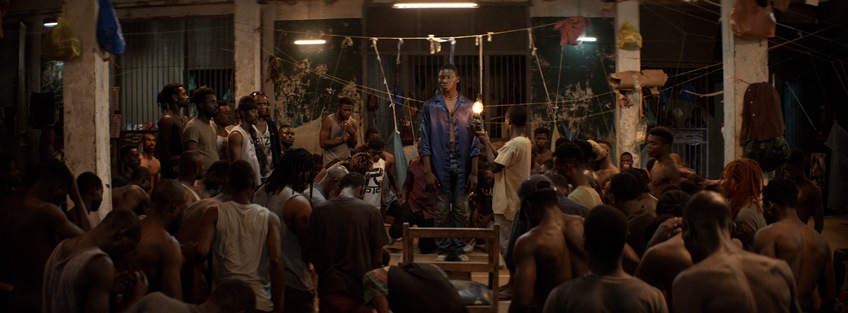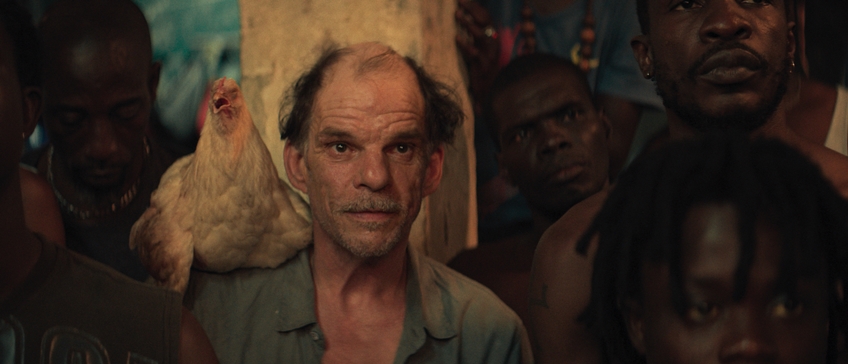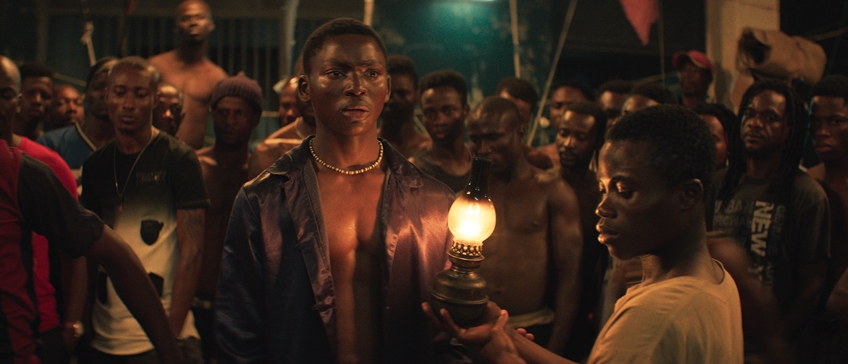Joyce Glasser reviews Night of the Kings (July 23, 2021) Cert 15, 93 mins.
Philippe Lacôte grew up in Abidjan near a movie theatre called “Le Magic” and the magic of entertainment, and in particular, storytelling, are at the heart of his second feature set in West Africa’s largest, most overpopulated and most violent prison, the Maca (La Maison d’Arret et de Correction d’Abidjan). The prison was constructed in a forest ironically known as the Banco National Park. The film can be classified as a prison drama, but a unique one, infused with the traditions and tribal warfare of the slums of Abidjan and the magical realism of the Ivory Coast.
Intertitles warn us that La MACA is a prison run by its own laws and codes. The drama opens with a lone young man in a yellow T-shirt (Kone Bakary) being carted into the prison under the eyes of the old guard and against the raucous of the ubiquitous, clambering noise of the rest of the inmates. Frightened, his head and his eyes darting around, he feels the threats and the horror of the unknown from all directions. What we later learn is this young man has just been arrested, betrayed by a rival, for his association with Zama King, the late leader of the Microbes in the slum known as the Lawless Quarter of Abidjan.
From the moment we enter the prison the realism gives way to a theatricality that includes a heavy dose of ritual, a chorus, martial arts performers, and trained dancers, but balanced by actual inmates who constitute 25% of the cast.

The boy in the yellow T-shirt is thrust into the mayhem of La MACA when a violent episode engulfs him upon entering. He is saved, but at the same time, condemned, when a lifer called Blackbeard (Steve Tientcheu) singles him out to be the new Roman, or storyteller. Roman is the French word for novel, and what all of these inmates, many illiterate, crave, is storytelling to pass away the unstructured, empty hours.
The boy protests that he doesn’t know any stories, but he is not being asked so much as told and then coaxed. The position is rewarded with food, drink and a private bed, along with ceremonial clothes and the chance to stand, protected, on a podium beyond the reach of the mob.
But the boy soon learns that this privileged status comes at a high price, for when the story ends, he must die. He is Scheherazade in the tradition of One Thousand and One Arabian Nights and he is tipped off by an old, silent man with a bird on his shoulder who tells him he should string the story out for as long as he can.

He must dig deep and, as with Lacôte himself, who spent time in La MACA as a child visiting his mother, a political prisoner, our own lives are stories that, depending on how they are told, can be of universal interest. His short autobiographical documentary Chronicles of War on the Ivory Coast about the curfew imposed by leader Laurent Gbagbo combined current politics with storytelling at a rudimentary, if powerful, level. As the film progresses, we observe how the Roman grows in confidence, and learns to heighten the drama and give the audience what it wants.
What story would interest a group of hardened criminals, the products of a colonial past, gang warfare, tribal politics, a corrupt government and abject poverty? The boy tells the story of Zama, whom he calls Zama the King, tracing his roots to the kings and queens of the Ivory Coast whose fantastical legends he seems to invent.
The Roman’s audience will have heard of Zama. The real-life Zama named his gang Les Microbes after the gang in the Brazilian film City of God a film about real-life gang warfare in a notorious favela and his story was similar. The audience demonstrate their involvement in the story by participating singing and dancing in certain places, suggesting the resonance of the myth that the Roman is creating around his hero. They will also make their criticisms clear, and the Roman must learn to react quickly to recapture the audience’s attention.
The boy erroneously begins with the end, telling his rapt audience that yesterday at 5 he was with Zama, Baldwin and Rocky. Flashbacks show the boy in the slum of the Lawless Quarter when Zama is set upon by a rival mob and murdered horrifically. The police searched the area, and a snitch ensured the boy was implicated.
The Roman’s desperate attempt at staving off death by going back to fill in or correct parts of his story, and even starting from the beginning with the story of Zama’s father and mother are a major part of the film. The Roman’s life, hanging on the thread of a story, and the story of the doomed Zama are intertwined with the imminent ritual suicide of Dangôro, the Supreme, but doomed Leader.
Nivaquine (Issaka Sawadogo) who appears to be a warden watching the action through a small window in a fortified office within the prison, says that La MACA is the only prison in the world run by an inmate.
But if Blackbeard or Dangôro, is the inmate in question, his reign is governed by ritual and tradition. When it is confirmed, in a written procedure, that the moon is red, the Dangôro, who is ill, can no longer rule and must die. Dangôro wants Roman killed, but can the boy hold out until Dangôro’s death and somehow save himself?
The film is at once a theatricalised prison drama, an allegory about storytelling and script writing, and a metaphor for the violence that erupted in the country when former President Gbagbo was arrested (he was later acquitted by the Internal Criminal Court). Dangôro could represent the ousted leader whose ruthless would-be successors jockey for position. We see them trying to appeal to the leader behind whose back they plan their bid for power. Both Lass (Abdoul Karim Konate) and his rival Half-Mad (Jean Cyrille Digbeu) fight for the place in the midst of the Roman’s storytelling, becoming part of the story.
It is a story that goes on today. While entertaining and thrilling for the most part, the story telling does grow tiresome in places and the theatricality of the film may become heavy handed for viewers who are not immersed in this African Gesamtkunstwerk
Joyce Glasser, Mature Times film critic.




